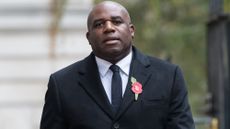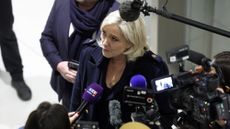Trump goes it alone
This isn't isolationism. It's abandon.


It is now undeniable that President Trump's combative, impetuous character and cluster of bedrock beliefs about a zero-sum world of ruthless, cutthroat competition among rivals have combined to produce a situation that may well shred the global trading and alliance system, as well as the rule-based international order, that the U.S. has built and nurtured over the past 70 years.
From his statements during the GOP primaries and general election, we knew this was one possible outcome of a Trump presidency. But we had reason to hope that in the unlikely event of a Trump victory, it would prove to have been mere rhetorical bluster.
The administration's message and behavior throughout Trump's first year in office was mixed enough to leave everyone uncertain. Yes, he still hurled insults at allies and friends via Twitter and sometimes before the press, and he did bow out of the Paris climate accord early on. But the Iran deal remained in force, he kept stabilizing troops in Afghanistan, and he even attempted (twice) to enforce the chemical weapons ban in Syria. (True, he did it by violating international law against the unauthorized use of military force, but these were hardly the first examples of an American president engaging in that kind of hypocrisy.)
Subscribe to The Week
Escape your echo chamber. Get the facts behind the news, plus analysis from multiple perspectives.

Sign up for The Week's Free Newsletters
From our morning news briefing to a weekly Good News Newsletter, get the best of The Week delivered directly to your inbox.
From our morning news briefing to a weekly Good News Newsletter, get the best of The Week delivered directly to your inbox.
By now, however, it's clear that this relative stability was largely a product of a new president allowing himself to be hemmed in by advisers and staffers who sought to contain his most destructive impulses. That is no longer the dynamic inside the administration. A more confident Trump is imposing (or threatening to impose) tariffs around the world. He's withdrawn from the Iran deal. And he and his top advisers are flagrantly insulting our closest allies while shamelessly taking Vladimir Putin's side in his disputes with Western powers.
As one senior White House official put it to The Atlantic's Jeffrey Goldberg, Trump is pursuing a foreign policy doctrine that can be summarized as: "We're America, bitch." Translation: We will do whatever we want without regard for external or self-imposed constraints, we expect the rest of the world to defer to us when we do, and we'll declare these intentions in the most vulgar, arrogant, and condescending language imaginable.
It's important to recognize that, although such a doctrine is likely to produce an America that is profoundly isolated from the rest of the world, it's not a doctrine of "isolationism," as that term is typically deployed in political discussion and debate — as a way of denigrating those who favor a foreign policy of realism and restraint by portraying them as favoring the U.S. cutting ties with the outside world and turning inward. On the contrary, what the Trump administration is doing on the world stage doesn't necessarily imply restraint or withdrawal. It implies a range of possibilities, including confrontation (with Iran), provocation (with North Korea six months ago), and conciliation (with North Korea now).
A more accurate term would therefore be full-spectrum unilateralism. That could be compatible with restraint, but it need not be. It could just as easily entail a complete lack of restraint, as the U.S. does whatever it wants abroad, without regard for the interests and preferences of our allies and friends (or former allies and friends).
This sounds like a nightmare to many senior members of both parties, and to most of those who make up the country's foreign policy establishment. But voters are less committed to the United States playing nice with the world. In the last three non-incumbent presidential elections, the winner (George W. Bush; Barack Obama; Donald Trump) was the candidate less inclined to commit the country to nation-building, policing the world, imposing order, and punishing injustice around the globe.
The case of Bush is especially instructive. In his 2000 presidential campaign, Bush explicitly argued against nation-building and promised to pursue a foreign policy of restraint. This changed dramatically after the 9/11 attacks. But note that the shift did not involve a pivot toward internationalism — or at least not consistently.
Yes, some the Bush administration's case for invading Iraq, and the bulk of its retrospective justifications (made after it became clear that there were no hidden stockpiles of weapons of mass destruction in the country), emphasized the goal of democracy promotion. But in the lead-up to the invasion, there were also (from Dick Cheney and Donald Rumsfeld in particular) expressions of indifference and even barely concealed contempt toward those of our allies who dared to oppose us doing what we asserted to be in our national interest. Republicans in Congress and the right-wing noise machine took the same dismissive and hostile position. (Remember "Freedom Fries"?)
This outlook had roots in the early years of the republic. George Washington and John Quincy Adams espoused versions of it, laying out a vision of U.S foreign policy guided by the goal of national independence from alliances and the avoidance of entanglements in the affairs of other countries. Both men hoped and assumed such a stance would lead to American restraint on the world stage, and it did for much of the 19th century.
But by the turn of the 20th century, this had begun to change. In the Spanish-American War, the U.S. pursued explicitly imperialist aims in the Caribbean and western Pacific. Thrilled by his own experiences of battle, Theodore Roosevelt devised an ideology of foreign policy intervention in part to provide young American men with virtues that could only be acquired in combat. Woodrow Wilson sent American soldiers to fight in World War I for more moralistic reasons, hoping that their presence would help to hasten the arrival of a world without war. The popular backlash to this liberal Protestant crusade (and the more than 116,000 American deaths it produced in under two years) led directly to the so-called "isolationism" of the 1920s and '30s.
From World War II on, interventionism became the American norm, but it was undertaken in the name of upholding an international order we were constructing and leading, in large part to defend "the free world" against the totalitarian ambitions of the Soviet Union. Such noble and communitarian rhetoric obscured the reality that the United States now unilaterally waged major ideologically motivated wars (and conducted acts of covert subversion of foreign governments) in countries scattered across the planet: in Korea, Iran, Vietnam, Cambodia, Chile, Nicaragua, and others.
With the conclusion of the Cold War, genuine internationalism enjoyed a brief moment of ascendency, reaching an early peak with the Gulf War, in which the nations of the world banded together under the banner of U.S. leadership to enforce international laws, rules, and norms. This "new world order" largely persisted through the 1990s, with enforcement of "no fly zones" over Iraq and the Balkan intervention to stop the slaughter of innocents in the violence that followed the breakup of Yugoslavia.
But the brief era of internationalism sustained serious damage with the 9/11 attacks and has been tottering ever since. Yes, even under Obama, who ran for office proudly proclaiming his principled opposition to the Iraq War, charmed our allies, and tried to extricate us from international obligations in the Middle East, while simultaneously undertaking ill-considered military action with NATO in Libya. The Obama administration's foreign policy was an incoherent mess, but the impulse to step back from international leadership was there from the beginning and remained a powerful motive until the very end.
Now Trump has reverted to the much more rabid anti-internationalism of the immediate post-9/11 period, but without any pretense of moral motives or effort at self-restraint. That's the primary thing that distinguishes Trump's America from Lyndon Johnson's or George W. Bush's America: We are now unbound and unconstrained, a military and economic behemoth acting like a free agent, doing whatever we please on the world stage.
There's simply no way to know what will happen next.
Sign up for Today's Best Articles in your inbox
A free daily email with the biggest news stories of the day – and the best features from TheWeek.com
Damon Linker is a senior correspondent at TheWeek.com. He is also a former contributing editor at The New Republic and the author of The Theocons and The Religious Test.
-
 Why is Labour struggling to grow the economy
Why is Labour struggling to grow the economyToday's Big Question Britain's economy neared stagnation in the third quarter of the year
By Sorcha Bradley, The Week UK Published
-
 Best of frenemies: the famous faces back-pedalling and grovelling to win round Donald Trump
Best of frenemies: the famous faces back-pedalling and grovelling to win round Donald TrumpThe Explainer Politicians who previously criticised the president-elect are in an awkward position
By Chas Newkey-Burden, The Week UK Published
-
 Quiz of The Week: 9 - 15 November
Quiz of The Week: 9 - 15 NovemberHave you been paying attention to The Week's news?
By The Week Staff Published
-
 US election: who the billionaires are backing
US election: who the billionaires are backingThe Explainer More have endorsed Kamala Harris than Donald Trump, but among the 'ultra-rich' the split is more even
By Harriet Marsden, The Week UK Published
-
 US election: where things stand with one week to go
US election: where things stand with one week to goThe Explainer Harris' lead in the polls has been narrowing in Trump's favour, but her campaign remains 'cautiously optimistic'
By Harriet Marsden, The Week UK Published
-
 Is Trump okay?
Is Trump okay?Today's Big Question Former president's mental fitness and alleged cognitive decline firmly back in the spotlight after 'bizarre' town hall event
By Harriet Marsden, The Week UK Published
-
 The life and times of Kamala Harris
The life and times of Kamala HarrisThe Explainer The vice-president is narrowly leading the race to become the next US president. How did she get to where she is now?
By The Week UK Published
-
 Will 'weirdly civil' VP debate move dial in US election?
Will 'weirdly civil' VP debate move dial in US election?Today's Big Question 'Diametrically opposed' candidates showed 'a lot of commonality' on some issues, but offered competing visions for America's future and democracy
By Harriet Marsden, The Week UK Published
-
 1 of 6 'Trump Train' drivers liable in Biden bus blockade
1 of 6 'Trump Train' drivers liable in Biden bus blockadeSpeed Read Only one of the accused was found liable in the case concerning the deliberate slowing of a 2020 Biden campaign bus
By Peter Weber, The Week US Published
-
 How could J.D. Vance impact the special relationship?
How could J.D. Vance impact the special relationship?Today's Big Question Trump's hawkish pick for VP said UK is the first 'truly Islamist country' with a nuclear weapon
By Harriet Marsden, The Week UK Published
-
 Biden, Trump urge calm after assassination attempt
Biden, Trump urge calm after assassination attemptSpeed Reads A 20-year-old gunman grazed Trump's ear and fatally shot a rally attendee on Saturday
By Peter Weber, The Week US Published